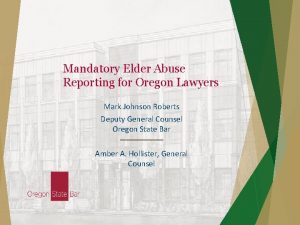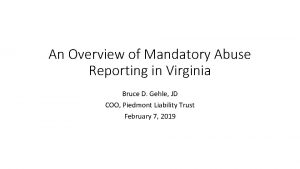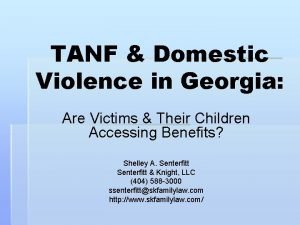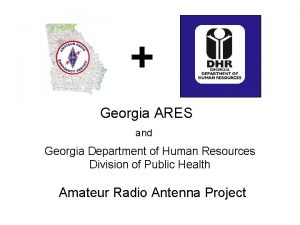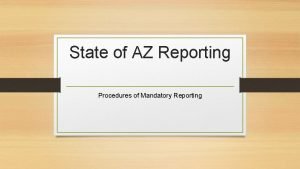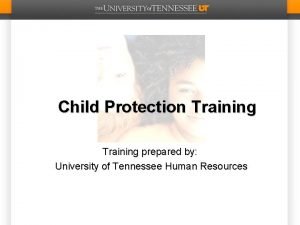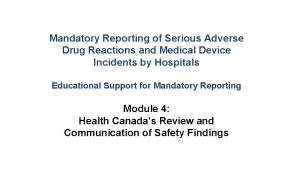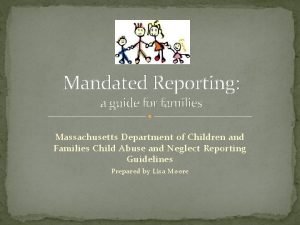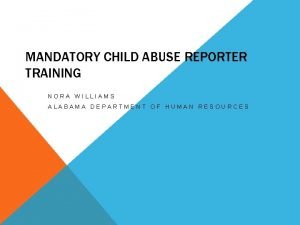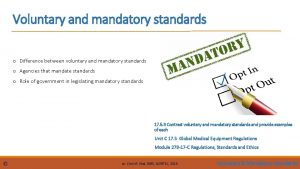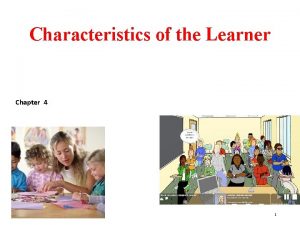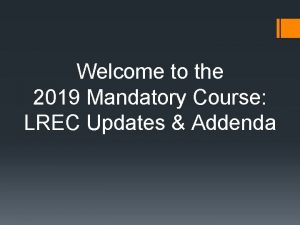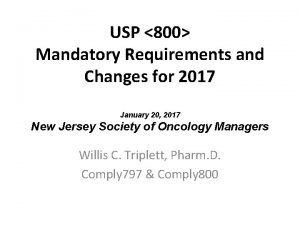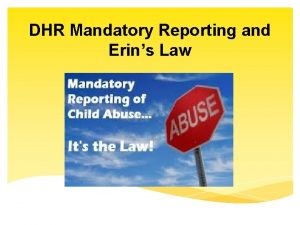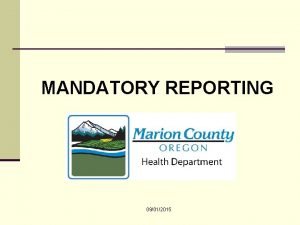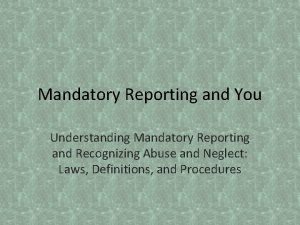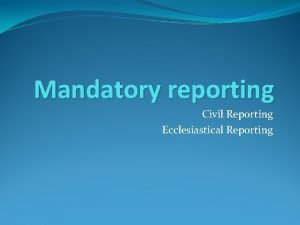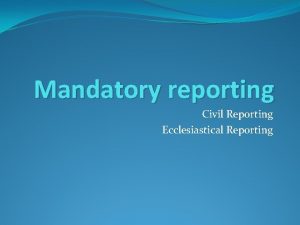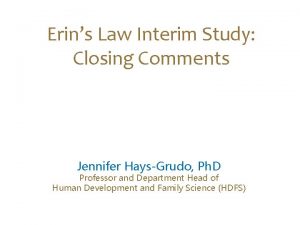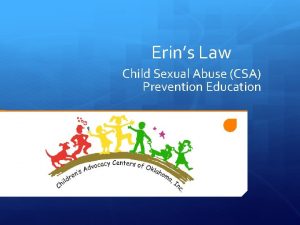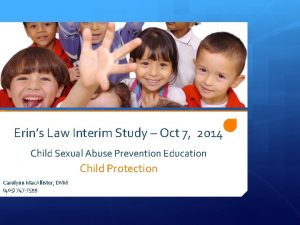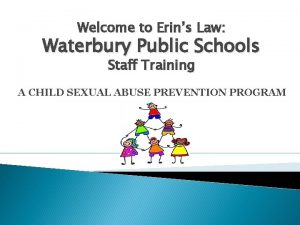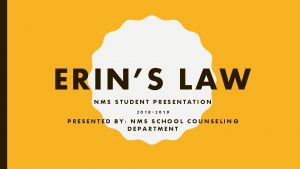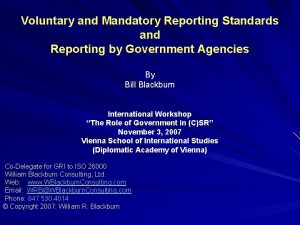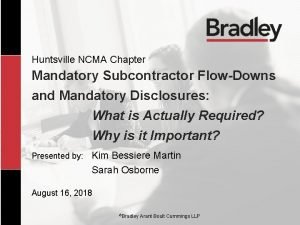DHR Mandatory Reporting and Erins Law DHR Reporting



















- Slides: 19

DHR Mandatory Reporting and Erin’s Law

DHR Reporting Training Outline I. Mandatory Reporters and the Responsibility to Report II. Erin’s Law III. What is Child Abuse and Neglect? IV. Possible Warning Signs of Child Sexual Abuse V. When A Child Tells About Sexual Abuse (What Adults Need To Know) VI. How To Handle the Disclosure of Child Sexual Abuse VII. Helping Teens Know Their Personal Rights VIII. DHR Report Process- Do’s and Dont’s IX. DHR Report Process- Contacts X. DHR Written Report of Suspected Child Abuse/Neglect Sources: Baldwin County Board of Education – School Counseling https: //www. age-of-consent. info/states/Alabama http: //www. aacap. org/AACAP/Families_and_Youth/Facts_for_Families/FActs_for_Families_Pages/Responding_To_Child_Sexual_ Abuse_28. aspx http: //www. nsopw. gov/en-US/Education/Talking. Child http: //www. parentsprotect. co. uk/what_to_do_if_a_child_tells_about_abuse. htm

Mandatory Reporting ALL School Employees Are MANDATORY REPORTERS

If a student discloses to a teacher or any other staff member that he/she has been abused or neglected in any way, that teacher or staff member has the responsibility to inform DHR of the information that has been disclosed to him/her. It is not permissible for the teacher (or any other faculty and staff member) to ask the counselor or social worker to make the report to DHR on their behalf.

Erin’s Law- Passed in Alabama June 2015

Erin’s Law Erin Merryn, a victim of sexual abuse as a child Erin’s Law is legislation that requires public schools to provide child sexual abuse prevention education to students in grades K -12. In addition, all school personnel are expected to be provided with professional development in regards to talking with students about child sexual abuse prevention, the effects of child sexual abuse on children, the handling of child sexual abuse disclosure, and mandated reporting. The main intent of Erin’s Law is to shatter the silence and stigma around child sexual abuse and to educate children and to empower them to recognize and to report abuse.

Lauren’s Kids Curriculum Baldwin County Schools have adopted the Lauren’s Kids Curriculum in response to Erin’s Law. The Lauren’s Kids Safer, Smarter Schools curriculum is the country’s first Pre-Kindergarten through grade 12 school-based prevention and personal safety curriculum series. The curriculum contains educationally sound content for children, parents, teachers and administrators. The Safer, Smarter Kids program spans Pre-Kindergarten through grade 5, as well as special education; Safer, Smarter Teens provides lessons for middle and high school students.

What is Child Abuse? Under Alabama law, it is "harm or threatened harm to a child's health or welfare which can occur through non-accidental physical or mental injury; sexual abuse or attempted sexual abuse; sexual exploitation or attempted sexual exploitation. ” What is Child Neglect? Under Alabama law, it is "negligent treatment or maltreatment of a child, including the failure to provide adequate food, medical treatment, clothing, or shelter: provided, however, that a parent or guardian legitimately practicing his religious beliefs who thereby does not provide specified medical treatment for a child, for that reason alone shall not be considered a negligent parent or guardian; however, such an exception shall not preclude a court from ordering that medical services be provided to the child, where his health requires it. "

Warning Signs in Adolescents of Possible Child Sexual Abuse What to watch out for in adolescents: unusual interest in or avoidance of all things of a sexual nature sleep problems or nightmares, anxiety and fears depression or withdrawal from friends or family, or clingy behavior seductiveness and sexual acting out behavior statements that their bodies are dirty or damaged, or fear that there is something wrong with them in the genital area refusal to go to school, school problems, or failure delinquency/conduct problems secretiveness fear of entering into new relationships or activities aspects of sexual molestation in drawings, games, fantasies unusual anger and aggressiveness, or self-harm (cutting, etc. ) suicidal behavior, drug and alcohol abuse

When a Child Tells About Sexual Abuse What Adults Need To Know: Sexual abuse can involve touching or fondling, sexual relations, or even situations that don’t involve touching such as taking pornographic photos or making obscene phone calls. Sexual abuse can happen when someone takes advantage of a supervisory position or a significant age difference to coerce, threaten, or force sexual contact. For teens, sexual abuse often involves emotional manipulation or “grooming. ” Three quarters of children who are sexually abused do not tell anyone about it and many keep their secret all their lives. Statistically speaking, as many as one in three girls and one in six boys will experience some form of sexual abuse before the age of 18. Sexual abusers are more likely to be people we know, and could well be people we care about; after all more than 8 out of 10 children who are sexually abused know their abuser. They are family members or friends, neighbors or babysitters – many hold responsible positions in society. The closer the relationship between the abuser and the victim, the less likely they are to talk about it. Often there are no obvious external signs of child sexual abuse. Some signs can only be detected on physical exam by a physician. Sexual abuse can also include noncontact abuse, such as exposure, voyeurism, and child pornography. The Alabama legal Age of Consent for sexual contact is 16 years old. In Alabama, a person 19 years old or older who subjects another person to sexual contact who is less than 16 years old, but more than 12 years old is charged with sexual abuse. Someone 16 or older who has intercourse with someone between the ages of 12 and 16 who is at least two years younger then they are can be charged with second-degree rape. Alabama has no Close-in-age Exemption to Alabama's age of consent. This means that anyone who engages in sexual activity with someone under the age of consent in Alabama is liable for prosecution, including people only a few years older then their sexual partner and even two individuals who are both under the age of consent.

How to Handle the Disclosure of Child Sexual Abuse Respond with Care and Urgency If you think a child is trying to tell you about a sexually abusive situation, respond promptly and with care. When a child tells someone about sexual abuse, a supportive, caring response is the first step in getting help for the child and reestablishing their trust in adults. Believe the Child If a child trusts you enough to tell you about abuse, you must remember that they rarely lie about such things. Although it may be hard to believe that someone we trust or care about is capable of sexually abusing a child, it's highly unlikely that a child would deliberately make false accusations. The pressures on the child to keep silent are enormous. It takes tremendous courage to talk about abuse. A child's claim that sexual abuse did not happen (when it actually did), or taking back a disclosure of abuse are common. Sometimes the child's account of what happened changes or evolves over time. This is a common pattern for disclosure and should not invalidate their story. While most allegations of sexual abuse made by children are true, some false accusations may arise in custody disputes and in other situations. It is up to the courts to determine this. Be Supportive It is important that they feel supported – don’t dismiss their claims or put them off talking about it.

How to Handle the Disclosure of Child Sexual Abuse What To Say: If a child even hints in a vague way that sexual abuse has occurred, encourage him or her to talk freely. Don't make judgmental comments. Stay calm and show that you understand take seriously what the child is saying. Child and adolescent psychiatrists have found that children who are listened to and understood do much better than those who are not. Responding to the disclosure of sexual abuse is very important to the child's healing from the trauma of sexual abuse. Assure the child that they did the right thing in telling. A child who is close to the abuser may feel guilty about revealing the secret. The child may feel frightened if the abuser has threatened to harm the child or other family members as punishment for telling the secret. Tell the child that he or she is not to blame for the sexual abuse. Most children in attempting to make sense out of the abuse will believe that somehow they caused it or may even view it as a form of punishment for imagined or real wrongdoings. Finally, offer the child protection, and promise that you will promptly take steps to see that the abuse stops. REPORT IT.

Helping Teens Know Their Personal Rights Help teens define their personal rights. Believe it or not, many teens who get caught up in an inappropriate relationship with an adult (or even someone their own age who is an abuser) blame themselves. They do not know what their personal rights are or what kind of behavior to expect from adults. Often, kids think they are supposed to respect their elders and be nice, so they go along with things that make them uncomfortable because they feel obligated. Teens should understand that: Their bodies are theirs. Past permission does not obligate them to future activity. They do not have to do anything they do not want to do. They should trust their instincts. It is not okay for them to engage in sexual behavior with adults. It is not okay for adults to take pictures or videos of them in sexual positions or unclothed. Regardless of how they dress or talk, it does not constitute permission. They deserve to be spoken to with respect and never feel coerced. Alcohol and drugs may make it hard for them to maintain their boundaries and can cloud their judgment. Touching someone sexually while they are intoxicated is abuse. Adults should not discuss their sexual fantasies or share pornography with minors. No one has the right to touch them without their permission.

DHR Report Process Report suspected cases of child abuse or neglect to the Department of Human Resources (DHR), as well as the principal. Although an oral report will initially be made, a written report should also be completed with a copy given to the school principal. DO NOT attempt to determine whether abuse or neglect has occurred. DO NOT contact the student’s family to determine the cause of suspected abuse or neglect. All records concerning reports of suspected abuse or neglect shall remain confidential and subject to the privacy limitations as established by law and BCBOE policy.

DHR Report Process DHR will conduct the investigation. Only report what is reported to you. In an emergency/crucial situation, if DHR is unable to respond immediately, or by the end of the school day, call the Sheriff’s Department. (The office hours for DHR are Monday-Friday from 8: 00 a. m. -4: 30 p. m. ) Obtain the following information about the child: Student’s full name Sex Race Date of birth Age Address Parents’ names Telephone number(s) Name(s) of sibling(s)

DHR Report Process The specific person who suspects or has knowledge of the abuse or neglect will call DHR, Children’s Protection Intake Division. The two intake workers at DHR are Ms. La. Kinda Taylor and Ms. Michelle Mosley. Ms. Taylor’s telephone number is 945 -2469 and Ms. Mosley’s telephone number is 947 -8365. (The Baldwin County Sheriff’s Office number is 937 -0202. ) As soon after the oral report is made, the person contacting DHR (or the Sheriff’s Office) should provide a written report to either DHR or the Sheriff’s Office. The written report may be e-mailed to either Ms. Taylor at Lakinda. Taylor@dhr. alabama. gov or to Ms. Mosley at Michelle. Mosley@dhr. alabama. gov Should a report need to be faxed, it will be routed directly to the Intake Department. The fax number for DHR is 945 -2491. The principal should always be notified of such allegations pertaining to abuse and/or neglect.

How can I be certain that a child has been abused or neglected? Certainty is not required. In most instances, the only way you could be absolutely certain that a child had been abused or neglected would be if the parent or other person admitted it. All that is required is a reasonable suspicion that a child is a victim of abuse or neglect. After investigating the report, the department determines whether abuse and/or neglect occurred. How am I protected? All persons reporting suspected abuse or neglect (whether required by law to report or not) are presumed to be acting in good faith. They are, by law, immune from legal action, civil or criminal, that might otherwise be taken. Thus, you have full protection in the event a parent or someone else should seek to initiate action against you. Will I have to testify in court? That depends on the nature and severity of the case, whether court action is initiated to remove the child from the home, and whether the alleged party is prosecuted on a criminal charge. The law is specific: "the doctrine of privileged communication shall not be a ground for excluding any evidence regarding a child's injuries or the cause thereof. "

Written Report of Suspected Child Abuse/Neglect Click Here to Complete the DHR Written Report: file: //localhost/Users/kdoyle/Desktop/Child Abuse Form 1593 Updated 2014. doc The written report may be e-mailed to either Mrs. Barrett at anna. barrett@dhr. alabama. gov or to Mr. David Copeland at david. copeland@dhr. alabama. gov.

 Erins law oregon
Erins law oregon Erins law oregon
Erins law oregon Virginia mandatory reporting law domestic violence
Virginia mandatory reporting law domestic violence Www.odis.dhr.state.ga.us
Www.odis.dhr.state.ga.us Georgia ares
Georgia ares Mandatory reporting procedures
Mandatory reporting procedures Tn mandatory reporting laws
Tn mandatory reporting laws Mandatory reporting
Mandatory reporting Who is a mandated reporter in massachusetts
Who is a mandated reporter in massachusetts Mandated reporter alabama
Mandated reporter alabama Newton's first law and second law and third law
Newton's first law and second law and third law Newton's first law of motion
Newton's first law of motion V=k/p
V=k/p P=k/v
P=k/v Mandatory standards
Mandatory standards Modified chen notation
Modified chen notation What are the three determinants of learning
What are the three determinants of learning Lrec mandatory forms
Lrec mandatory forms Is usp 800 mandatory
Is usp 800 mandatory Nature is not mandatory but permissive
Nature is not mandatory but permissive
